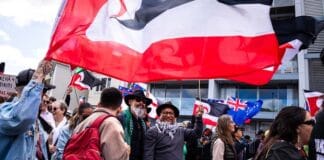There is growing criticism of the welfare quarantining measures within the “intervention” into Northern Territory Aboriginal communities. But the federal government has signalled its intention to expand the scheme into selected communities in WA, Queensland and NSW.
Despite his landmark apology to the stolen generations, Kevin Rudd’s government is aggressively pursuing policies in Aboriginal affairs based around punishment and assimilation.
At the end of February, minister for indigenous affairs Jenny Macklin used a WA coroner’s report detailing high levels of suicide amongst Aboriginal people to justify the introduction of welfare quarantine measures into the Kimberley and other communities.
Macklin argued, “All these decisions will be driven by one single criterion-evidence.”
But all the evidence contradicts the idea that a punitive, racially-based welfare quarantine could help address high rates of suicide in indigenous communities.
As a 2003 study by Professor Michael Chandler of the University of British Columbia demonstrates, what can make a real difference in reducing suicide rates is the existence of land rights, self-government and funding for community based services.
Evidence that withholding welfare can encourage school attendance is equally thin. In early March the NSW government announced that schools in Walgett would provide Centrelink with students’ attendance records, to allow the withholding of welfare benefits to families with children absent from school. But as Larissa Behrendt, director of research at the Jumbunna Indigenous House of Learning at UTS in Sydney argues: “There is no evidence that the use of welfare as a stick improves school attendance. In fact, all of the research points to the fact that using welfare payments in this way can add an additional stress factor into an already dysfunctional situation.”
More comprehensive measures were legislated in Queensland during February, with the establishment of a new Family Responsibility Commission to oversee the quarantining of welfare payments in four communities.
Macklin is not interested in evidence about what has happened in the NT either, where welfare quarantines are causing misery and displacement. Barbara Shaw, resident of Mt Nancy town camp explains that, “The quarantine is causing chaos for our people. Do they know that we went without over Christmas, that people are struggling to get food?”
But it is not just through withholding welfare that the new government is punishing Aboriginal people. In February, the National Indigenous Violence and Child Abuse Intelligence Task Force, comprised of 31 officers operating alongside the intervention, was granted dramatic “star chamber” powers by the Australian Crime Commission.
These powers, only previously used for investigations into terrorism and drug trafficking, allow it to force “unco-operative” community members and service providers to give evidence and preclude them discussing investigations with anyone other than their lawyer. Non-compliance can result in jail.
If successful, attacks on Aboriginal communities will make it easier to wind back welfare rights and public services in society as a whole. Macklin has repeatedly discussed implementation of quarantine provisions for other sections of the community, and this has already begun in WA.
Resistance
Those affected by the welfare quarantines continue to oppose them. In Yuendumu, not far from Alice Springs, the Community Council has been fighting hard to demand an end to the intervention.
Local people are refusing to co-operate, causing enormous tension in workplaces and across the town. Traditional owner Christopher Poulson has signalled that: “We don’t want the intervention people telling us what to do, so everyone is having a rough time, people are making enemies. We’re gunna stop this at Yuendumu”.
In early March, workers from the NSW Department of Aboriginal Affairs, who work directly running programs in Aboriginal communities, unanimously voted for a motion calling for the repeal of the intervention legislation at a workplace meeting of the public sector union (PSA).
On March 13 actions are planned across the country targeting Centrelink offices. People will travel into Alice Springs from a number of Central Australian communities. In Sydney the rally will be addressed by John Sutton, president of the CFMEU, who is also calling for the repeal of the intervention legislation.
We need to build the broadest possible support for communities resisting the intervention, and stop the rot before it spreads further.
The Sydney Aboriginal Rights Coalition meets 6pm Mondays in the Redfern Community Centre, Hugo st, Redfern
By Paddy Gibson





